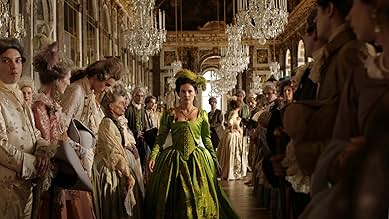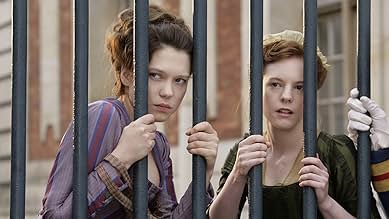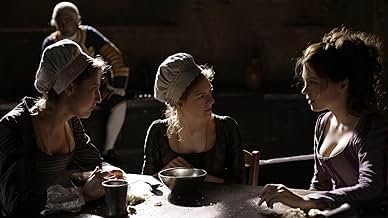VALUTAZIONE IMDb
6,2/10
9378
LA TUA VALUTAZIONE
Uno sguardo al rapporto platonico tra Maria Antonietta e una delle sue lettrici nei primi giorni della Rivoluzione francese.Uno sguardo al rapporto platonico tra Maria Antonietta e una delle sue lettrici nei primi giorni della Rivoluzione francese.Uno sguardo al rapporto platonico tra Maria Antonietta e una delle sue lettrici nei primi giorni della Rivoluzione francese.
- Regia
- Sceneggiatura
- Star
- Premi
- 6 vittorie e 12 candidature totali
Julie-Marie Parmentier
- La servante Honorine Aubert
- (as Julie-Marie Parmentier de la Comédie Française)
Marthe Guérin Caufman
- La domestique Alice
- (as Marthe Caufman)
Hervé Pierre
- L'abbé Hérissé
- (as Hervé Pierre de La Comédie Française)
Recensioni in evidenza
A marvelous film. Very rarely does a film based on fact, especially a story as infamous as this one, succeed at creating such tension despite the fact that everyone knows pretty much what is going on and what will happen (United 93 springs to mind). As it is director Benoît Jacquot and his team have done a incredible job in capturing the confusion, uncertainty and pure dread that those living at Versailles in the final days of the Monarchy must have felt. Seriously, anyone who's ever dismissed period dramas and films based on true stories as "stuffy", slow and boring should give this one a shot. The cast is also exceptionally strong, led by a group of immensely talented female performers. The only downside is really the ending, unfortunately, slightly anticlimactic and a bit of a let down.
Farewell My Queen screened recently at the Rendezvous with French Cinema festival in New York. A different take on the oft-told story of Marie Antoinette and the storming of the Bastille, this French film focuses on the difficult behind-the-scenes life at Versailles. An "Upstairs Downstairs" at the grandest palace of all, the protagonist is not the queen but rather her "lectrice" - a lady in waiting whose job is to read books to the bored Marie Antoinette. The film is best at depicting the petty backstabbing, gossiping and ambitions of the hangers-on at court. The crowded and dirty "back stairs" rooms are vividly contrasted to the opulence of the grand state halls. A well acted, nicely paced historical drama.
I love a good costume drama, but anything that includes Marie-Antoinette is apparently bound to be a repetition of the same old clichés over and over.
We get it, she was completely disconnected from reality, careless and pampered and bored and tended to for every bit a normal human being does itself. Age-old cliché that Marie-Antoinette was nothing more than a self-absorbed bimbo? Check.
We get it also, the French Revolution was an immense shock to the royalty and aristocracy; not only did they not see it coming, they didn't think it was possible at all to see the end of their reign. Again, the tried-and-true representation of 18th century French aristocrats as clueless morons? Check.
So, after reinstating the same backdrop again (and again), this version puts forth a bigger focus on rumours of a lesbian love affair the queen was accused of having back then, because that would make the movie so unique.. or not. The story was already a snorefest on paper so let's toss in some sexual material to spice it up in spite of one's better judgement? Check.
The list goes on.
The photo direction is beautiful, the costumes and decors are gorgeous, the actors are all excellent, all this movie is missing is an actual story worthy of your attention. A real shame.
We get it, she was completely disconnected from reality, careless and pampered and bored and tended to for every bit a normal human being does itself. Age-old cliché that Marie-Antoinette was nothing more than a self-absorbed bimbo? Check.
We get it also, the French Revolution was an immense shock to the royalty and aristocracy; not only did they not see it coming, they didn't think it was possible at all to see the end of their reign. Again, the tried-and-true representation of 18th century French aristocrats as clueless morons? Check.
So, after reinstating the same backdrop again (and again), this version puts forth a bigger focus on rumours of a lesbian love affair the queen was accused of having back then, because that would make the movie so unique.. or not. The story was already a snorefest on paper so let's toss in some sexual material to spice it up in spite of one's better judgement? Check.
The list goes on.
The photo direction is beautiful, the costumes and decors are gorgeous, the actors are all excellent, all this movie is missing is an actual story worthy of your attention. A real shame.
Written and directed by Benoît Jacquot and based on the novel by Chantal Thomas, Farewell, My Queen explores the death throes of the French monarchy over a period of three days in July, 1789. Set in the Palace of Versailles at the beginning of the French Revolution, Sidonie (Lea Seydoux), known as the reader for Queen Marie-Antoinette (Diane Kruger), is responsible for selecting books and reading them aloud to the queen. Because of her closeness to the monarch, she is able to act as a spy, securing information about events taking place inside and outside the palace, pressing selected servants for information, and eavesdropping on conversations to gather the most up-to-date gossip to pass along to Marie.
The film is seen from Sidonie's point of view, a vantage point that illuminates the sharp social divisions inside the palace with the servants living in crowded rat-infested quarters, and the royals dwelling in opulent accommodations. Lea Seydoux delivers a powerful performance as the devoted servant of the queen, conveying an air of mystery about who she really is in a way that adds to her allure. Kruger portrays Marie-Antoinette as sensual and hedonistic and there is a hint of more than Platonism in the way she interacts with both Sidonie and the Duchess de Polignac (Virginie Ledoyen), a relationship that tests Sidonie's loyalty.
On the morning of July 15th, news spreads rapidly that the king had been awakened at two in the morning. No one knows the reason, but fear spreads throughout the court. If the king is ill, who will protect those totally dependent on the nobles who control their lives? It is soon revealed, however, that the king is not ill, but that a mob has stormed the Bastille and a revolt has begun against the aristocracy. Little information is available. Rumors abound based only on conversations whispered in the hallways and the servant's quarters. When the King travels to Paris and the Queen decides against an escape to Metz, an aura of inevitably descends on the Palace and the nobles begin to abandon ship, competing for places on the coaches seeking a safe haven.
Antoinette makes every effort to continue with business as usual, looking at magazines to admire new styles and colors for the coming season, paying scant attention to the fact that her name is number one in a list of 300 targets for the guillotine. Fearful of losing her only connection to the world, Sidonie is willing to risk the ultimate sacrifice if it is in the queen's best interest. Even though Farewell, My Queen is historically questionable and may hold us at arms length emotionally, it provides a fresh view of events that we know about only from history books or stuffy costume dramas.
Jacquot captures the authenticity of time and place and also the human side of the power struggle. Unfortunately, the film pays little attention to the issues that led to the revolt, never mentioning the abuse of power by the monarchy. Indeed, the Revolution serves only as a backdrop for the story which is more about seduction, loyalty, and betrayal than social upheaval. Rather than making a statement that is relevant for our times, the intricacies of sexual intrigue and love triangles dominate the film, titillating rather than persuading, and making the goings on difficult to care about.
The film is seen from Sidonie's point of view, a vantage point that illuminates the sharp social divisions inside the palace with the servants living in crowded rat-infested quarters, and the royals dwelling in opulent accommodations. Lea Seydoux delivers a powerful performance as the devoted servant of the queen, conveying an air of mystery about who she really is in a way that adds to her allure. Kruger portrays Marie-Antoinette as sensual and hedonistic and there is a hint of more than Platonism in the way she interacts with both Sidonie and the Duchess de Polignac (Virginie Ledoyen), a relationship that tests Sidonie's loyalty.
On the morning of July 15th, news spreads rapidly that the king had been awakened at two in the morning. No one knows the reason, but fear spreads throughout the court. If the king is ill, who will protect those totally dependent on the nobles who control their lives? It is soon revealed, however, that the king is not ill, but that a mob has stormed the Bastille and a revolt has begun against the aristocracy. Little information is available. Rumors abound based only on conversations whispered in the hallways and the servant's quarters. When the King travels to Paris and the Queen decides against an escape to Metz, an aura of inevitably descends on the Palace and the nobles begin to abandon ship, competing for places on the coaches seeking a safe haven.
Antoinette makes every effort to continue with business as usual, looking at magazines to admire new styles and colors for the coming season, paying scant attention to the fact that her name is number one in a list of 300 targets for the guillotine. Fearful of losing her only connection to the world, Sidonie is willing to risk the ultimate sacrifice if it is in the queen's best interest. Even though Farewell, My Queen is historically questionable and may hold us at arms length emotionally, it provides a fresh view of events that we know about only from history books or stuffy costume dramas.
Jacquot captures the authenticity of time and place and also the human side of the power struggle. Unfortunately, the film pays little attention to the issues that led to the revolt, never mentioning the abuse of power by the monarchy. Indeed, the Revolution serves only as a backdrop for the story which is more about seduction, loyalty, and betrayal than social upheaval. Rather than making a statement that is relevant for our times, the intricacies of sexual intrigue and love triangles dominate the film, titillating rather than persuading, and making the goings on difficult to care about.
Before going in to see Farewell, My Queen, I really did not know too much about it and now I am glad that I knew little to nothing about the film before I saw it. I knew it was about Marie Antoinette, but that was about it. I haven't seen too many films about Marie Antoinette, other than Sofia Coppola's 2006 film which I liked quite a bit. Both films offer a different look and perspective on her, one of the things I really liked about this film as well. Lea Seydoux does a terrific job playing Sidonie Laborde, who is Marie Antoinette's reader. Seydoux allows her character to have a very curious side to her and at times she is really determined to stand up for what she believes in and can be forceful all at the same time as having an innocence to her as most young women do. It's a great performance and one that I hope leads to a successful career for her. Diane Kruger, who plays Marie Antoinette does a good job as well, but at times I did find her performance a tad melodramatic and so sometimes it felt a bit forced, or over the top. However, both Seydoux and Kruger both do show infatuation and they show it well. I can not go into any more detail than that, or I would ruin the film, but Kruger is especially good at showing Marie Antoinette's more softer and human side. A side that recognizes her fear, her flaws and truths about her own personality. Seydoux's character Sidonie is so loyal to the queen that she almost loves her, but as the film goes on, we are not really sure why. The queen can be very vicious and uncaring to Sidonie, but yet this young woman cares deeply about the queen and what is in the queen's best interest is most important for Sidonie putting the queen's needs even ahead of her own. As, I got thinking about the film, I think this part of it really had an impact on me and touched me and made me think in several ways. Here is a young woman who is more, or less an orphan and goes about her life serving and thinking of ways to keep the queen happy even though she herself lives in squalor and does not have the material wealth, possessions, or honour that the queen has. The queen seems to have everything and yet seems only to think about herself, whereas Sidonie was born with nothing and lives with nothing, but feels in her heart and soul that it is her job to serve the queen and she will do so no matter what, even if there could be consequences to her decisions. My only other complaint about the film was that at times it did feel a bit rushed and maybe moved from one event to another quite quickly, but that did not stop my enjoyment of the film, I think it just asks us as viewers to be a little more patient and do some of the character analysis, or study on our own, or even after the film is over. Even though the film does move by fast we are especially treated to a very good character study of Sidonie, who I think is the most interesting character in the film and probably the one we can relate to and even care about the most. She seems the most human whereas everyone else really does seem to be looking out for themselves and not really caring about what happens to the person next to them. The film does a credible job of showing the majestic costumes and lavish clothes and settings where Marie Antoinette lives, but at the same time it shows the dark and dingy place where Sidonie eats and sleeps and basically calls home. There is an element here showing a class struggle between these two characters and the more you think of it, the more evident it becomes. Farewell, My Queen is a good looking film with a terrific performance by Lea Seydoux, good character study and a film that gives us much to think about and even more to appreciate after the film is over and we have thought it over for awhile. As, I have said before, this is the quality of a great film.
Lo sapevi?
- QuizIn this movie, Diane Kruger speaks French with a German/Austrian accent - which is undoubtedly how the Austrian-born Marie Antoinette would have spoken herself.
- BlooperOn several occasions when soldiers are marching through the main and side gates of Versailles, and also when Sidonie goes to Le Petite Trianon for the first time and falls into a puddle, you can clearly see the very 21st century anti-terrorism concrete security barriers and bollards flanking the gates.
- Citazioni
Agathe-Sidonie Laborde: In a way, Your Majesty, you're asking me to go as bait.
La reine Marie Antoinette: An ugly word for a pretty mouth!
Agathe-Sidonie Laborde: Words are all I possess. I wield them well.
- ConnessioniReferenced in Parole de cinéaste: Benoît Jacquot (2017)
I più visti
Accedi per valutare e creare un elenco di titoli salvati per ottenere consigli personalizzati
- How long is Farewell, My Queen?Powered by Alexa
Dettagli
- Data di uscita
- Paesi di origine
- Siti ufficiali
- Lingue
- Celebre anche come
- Farewell, My Queen
- Luoghi delle riprese
- Aziende produttrici
- Vedi altri crediti dell’azienda su IMDbPro
Botteghino
- Lordo Stati Uniti e Canada
- 1.597.998 USD
- Fine settimana di apertura Stati Uniti e Canada
- 72.100 USD
- 15 lug 2012
- Lordo in tutto il mondo
- 6.366.835 USD
- Tempo di esecuzione1 ora 40 minuti
- Colore
- Mix di suoni
- Proporzioni
- 2.35 : 1
Contribuisci a questa pagina
Suggerisci una modifica o aggiungi i contenuti mancanti

Divario superiore
By what name was Addio mia regina (2012) officially released in India in English?
Rispondi

































